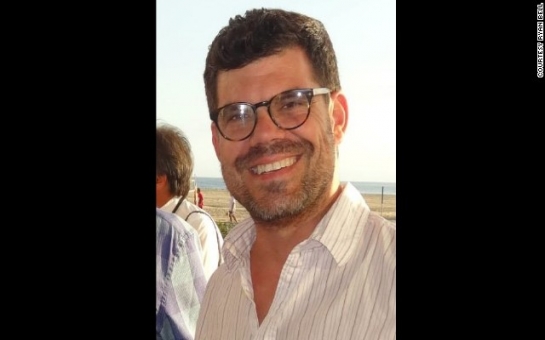Ryan Bell, a one-time Christian pastor, says he didn't expect his yearlong experiment with atheism to get much attention.
"This wasn't intended to be an international journey that was done in public," he told CNN's Brooke Baldwin last Wednesday.But what began as Bell's personal project has now been covered by NPR, the BBC, Religion News Service, and, of course, here at CNN.It's not just the mainstream media that are along for the ride, either. Dozens of blogs and columnists have weighed in on Bell's "Year Without God," with responses ranging from support to skepticism to scorn.Sikivu Hutchinson, a writer who has criticized the lack of racial diversity in the the atheist community, called Bell's foray into atheism "secular tourism.""Bell joins a jam-packed, largely white, mostly Christian cottage industry of religious leaders who are capitalizing off of untapped reserves of atheist dollars, adulation and publicity by jumping onto the 'maverick ex-pastor' bandwagon," Hutchinson wrote in a recent blog post.PZ Myers, an American scientist and prolific blogger on atheism, echoed Hutchinson's comments, and called Bell's experiment "simply ridiculous.""It’s not a set of superficial practices, it’s a mindset," Myers said of atheism. "What’s he going to do at the end of the year, erase his brain?"Since the responses have been so varied - and so interesting - we wanted to know what other thinkers and scholars have to say about Bell's experiment with atheism.In short, we asked a whole bunch of smart folks if it's really possible to "try" atheism for a year. Perhaps unsurprisingly, we got a wide variety of answers (The old adage about "three rabbis, four opinions" seems to apply to atheists as well.)Some of these submissions have been edited for length and clarity.Catherine Dunphy, executive director of The Clergy Project It would be accurate to say that some of our members tried similar experiments, though in a much less public fashion and for a shorter period of time before leaving their faith.For myself, it was in stages. First, I decided to just stop praying and see what would happen. Then I stopped going to church, and finally I decided that the idea of God just didn't make sense.It was like learning to swim with "water wings." Eventually I realized I could float all by myself.Testing the atheism waters, is in many ways an intellectual process but it is also intrinsically linked to emotion. God is often seen as a surrogate parent, a protector, a supporter. Untangling oneself from this type of over arching narrative is never easy.Bell should be applauded for his attempt to ask the hard questions. Whether he'll be a theist or atheist on the other side of this journey, I don't know. But it is a good thing that he is wondering.Penny Edgell, sociology professor, University of Minnesota What Bell is doing makes a sense if you remember that it is through daily practice that we become the people we are. Meditation, daily prayers and devotions ... these are how people become Christian, Muslim, a believer of any kind.And it's not just religion; there are all kinds of practical, self-help guides to being a better mom, a better husband, a more passionate lover, etc., all of which focus on doing the things that a better mom, husband, or lover would do until you a) feel more momly, husbandly, loverly feelings and b) it becomes a habit to act in the appropriate role-enhancing way.So there is no reason to be skeptical about Bell's experiment. Quite the opposite - it may work, and more profoundly than he anticipates. A year is a long time, and if he really spends that year doing the things an atheist would do, he may not only act like an atheist, but feel like one, and in that union of action and feeling, find that he has become one.Paul Fidalgo, spokesman, Center for Inquiry I think there is at least potential for profound personal and political implications to the discoveries Bell may make in his experiment.Many people in times of crisis put a great deal of hope in the idea that God will come through, or execute a plan that makes sense of it all. But what happens when the mental and emotional energy that goes into prayer and wishing were put toward something more concrete?Bell’s experiment won’t settle the religion-versus-nonreligion debate by any stretch of the imagination.But he might help us to understand what powers we sacrifice when we spend less of ourselves on entreaties to an unknowable being, and direct those energies toward dealing with the real world, as it is, right now.Dale McGowan, author of "Parenting Beyond Belief" and "Atheism for Dummies"Trying atheism is not only possible, it’s a very common step out of religious belief. The comedian and author Julia Sweeney called it “putting on the No-God glasses” to see what the world looks like when you stop assuming a god is running things.A lot depends on how serious and honest someone is in the experiment. There’s a tendency to scramble back to old explanations at the first snap of a twig or the first feeling of wonder.But those whose will to know is stronger than the will to believe usually find their way out. And when they do, the most common emotion they describe isn’t the anguish and despair they were told to expect — it’s freedom and relief.Dave Muscato, spokesman, American Atheists I think what Ryan Bell is doing is a great thing. It's important to try to see other points of view so that you can have a better understanding of why other people don't believe the same things that you do. I don't think it's quite possible to try on the absence of belief the way he's intending to, though.If Bell has made the choice to drop faith in superstition in favor of what the evidence shows, then he can understand the atheist experience. If he is holding on, he's not doing what an atheist does. He's simply not practicing his religion. I would say that a better name for this would be a lapsed Christian, not an atheist.An atheist is an active role, not a passive one. We don't simply stop reading the Bible and stop praying and stop going to church. We love the process of learning and exploring answers.Instead of resorting to "God did it," atheists are comfortable saying "I don't know, but I'm going to find out." That's where the fun starts; it means we're on the right path to finding the real answers to our questions.David Myers, professor of psychology, Hope College In my book, "A Friendly Letter to Skeptics and Atheists," I quote the Christian author C. S. Lewis:"Believe in God and you will have to face hours when it seems obvious that this material world is the only reality; disbelieve in Him and you must face hours when this material world seems to shout at you that it is not all. No conviction, religious or irreligious, will, of itself, end once and for all [these doubts] in the soul. Only the practice of Faith resulting in the habit of Faith will gradually do that.”Indeed, psychological science confirms that attitudes and beliefs tend to follow behavior. Act as if you believe—or don’t—and in time your beliefs may shift toward your actions.Mitchell Stephens, author, "Imagine There’s No Heaven: How Atheism Helped Create the Modern World"I admit to being uncomfortable with the notion of “trying” atheism.Can you try to have a conviction? And atheism, unlike religion, is not something that is simply accepted on faith. It presumes to be the result of reasoning and investigation. Limiting the experiment to a year also seems a bit artificial: that reasoning and investigation should never end.Perhaps by “trying,” however, Bell means allowing yourself to be open to arguments that challenge your convictions. That certainly is noble. And the reading list of atheists and some of the West’s great questioners Bell has assigned himself is impressive. I would hope that nonbelievers would be as eager to confront the ideas of Kierkegaard or Dostoevsky.Doubt, too, is noble. Surely, there is enough of it recorded in the gospels. Bell deserves credit for exploring rather than suppressing his doubts. He seems a thoughtful and courageous man. It is easy to imagine this being a rich and rewarding year – or lifetime.It is a shame that some of Bell’s co-religionists are not better able to tolerate this exercise in openness and doubt. Perhaps that is one of the limitations of resting convictions upon faith rather than reasoning and investigation.Merold Westphal, philosophy professor, Fordham University I think it is possible to "try" either atheistic unbelief or theistic belief to see if it "fits" in the sense of doing the practices that go with the position - praying or not praying, going to church or not going to church, reading the Bible or not reading the Bible, etc.But I very much doubt that it is possible to suspend belief in the sense Bell suggested.We do get caught up in the world of a movie and feel, for example, real anxiety. But then someone coughs or talks and we remember that what we are watching and hearing is fiction and the real world is the one where I'm sitting in a theater. We haven't ceased to believe, and the sense in which we have temporarily suspended belief (for an hour or two, not for a year) depends on powerful external aids. I'm not sure ceasing the practices of faith can have the same result, especially over so long a time.Lauren Anderson Youngblood, spokesperson, Secular Coalition for America I'm not exactly sure how you would "try" it, because atheism is not a religion with rituals and obligations (attending church, fasting, not eating pork, etc).Either you believe or don't believe. If you're on the fence, I would say you're an agnostic, not "trying" atheism.(CNN)ANN.Az
Follow us !











